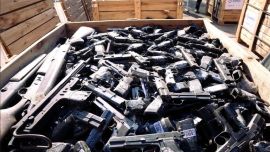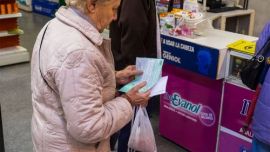Former president Cristina Fernández de Kirchner was the “main recipient” of alleged bribes from business leaders to politicians in Argentina between 2003 and 2015, prosecutors claimed in court Thursday.
The remarks were made during the so-called ‘Cuadernos’ corruption notebooks graft trial, a massive court case probing alleged graft that began in early November.
Fernández de Kirchner, 72, and another 85 former officials and business figures stand accused of running a massive network of corruption to secure benefits or public-works contracts through kickbacks and bribes between 2003 and 2015, when Argentina was governed by her and by her husband, Néstor Kirchner.
Formally, the ex-president has been charged with heading an illicit association and co-authoring acts of passive bribery.
Also among the accused are former Federal Planning Ministry officials Julio De Vido and Roberto Baratta, as well as dozens of construction and energy executives, some of whom have admitted to paying bribes of between 10 and 20 percent on contracts.
On Thursday, the court’s prosecutors continued reading out the procedural findings during a hearing that was broadcast via videoconference to the accused and the wider public.
According to the investigation, business executives delivered bundles of cash to emissaries of the two Kirchner administrations. Fernandez de Kirchner, the court heard from prosecutors, was the head of the network and “the main recipient” of the alleged payments.
“Both sides obtained benefits,” prosecutors said in the indictment read out to Federal Oral Court No. 7 (TOF 7) in Buenos Aires.
Business leaders gained returns through bribes that “public officials,” with Fernández de Kirchner as the top leader – “used to enrich themselves and secure the continuity of the operation,” continued the indictment.
Hearings are being held virtually. Fernández de Kirchner is participating from her home in Buenos Aires, where she is serving a six-year sentence for fraudulent administration related to public works contracts in her home province of Santa Cruz, a conviction upheld by the Supreme Court earlier this year. She remains under house arrest at her flat on San José 1111 in central Buenos Aires, wearing an electronic ankle monitor.
In this new case, she faces a potential sentence of up to 12 years in prison if found guilty.
According to the indictment, “it was corroborated … that all the business leaders acted freely.” Several of the accused have turned whistleblower, giving evidence to the state in exchange for lighter sentences.
The so-called "Causa Cuadernos" (“notebook case”) stems from records allegedly kept for years by Oscar Centeno, a driver at the Federal Planning Ministry, who wrote down routes, names of officials and businesspeople, and the sums of money he claimed to have delivered.
The contents of the notebooks has been challenged by the former president’s defence, which argued they had been tampered with. Several handwriting analyses determined that more than one person contributed to the notes.
The case has two hearings a week and is expected to move to in-person sessions at a later stage.
Thursday’s hearing included the reading of Fernández de Kirchner’s statement submitted during the investigation phase, in which she denied “categorically and absolutely having taken part in any type of illicit association or having committed any crime whatsoever.”
“The investigation deliberately targeted me, despite having trampled each and every guarantee of due legal process, has not managed to produce even minimal evidence to support the crimes falsely attributed to me,” the court read.
Fernández de Kirchner has led Argentina’s Peronist movement for more than a decade and currently chairs the Partido Justicialista (PJ), its main faction.
She denies the allegations against her and says they are a part of a campaign of judicial and political persecution.
The Judiciary recently ordered the seizure of US$480 million in assets belonging to Fernández de Kirchner, her family and co-accused, as compensation for damage caused to the state in another corruption case.
– TIMES/AFP/NA






















Comments